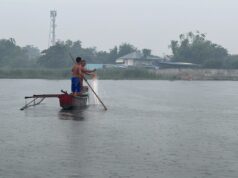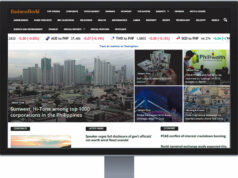All the ways you can lose your bitcoin
THERE ARE LOTS of opportunities for cryptocurrency to go missing -- some inherent to buying internet money, some involving crime. Below, a few common ways of going virtually broke.
For better or for worse: Duterte as disruptor
PRESIDENT Rodrigo R. Duterte as disruptor has been quite a running theme by now, two years into his administration. But above all, this theme is a tangible reality being felt by the country -- by its citizenry and its stakeholders -- whether one considers the body count in the drug war or the presidential pronouncements almost out of the blue that have led to disruption here and there in the business community.
Inflation worldwide is declining, no special credit to Dutertenomics
“Money cannot call forth goods, but goods can call forth money…” -- David Ricardo,
on the “mere increase of money” (1809)
on the “mere increase of money” (1809)
Off-track? Learning from our TRAIN experience
THE CHORUS of lawmakers and various groups calling for the Tax Reform for Acceleration and Inclusion (TRAIN)’s suspension amidst inflation rates peaking to four-year highs has only grown louder. The chief architects of the law have been put on the defensive, vehemently explaining that the rise in prices was predominantly driven by external factors. Even the president himself, who usually refrains from talking about economic issues, has offered his two cents on the debate. While he acknowledged that TRAIN is one of the factors driving up inflation, he emphasized that he needed money to run the country.
Two years of Dutertismo
IN 2016, we witnessed power shifts around the world with the rise of populist, nativist, or nationalist politics on a global scale. Rebalancing themselves between change and continuity, the demands for radical social change have gotten more pronounced due to rising inequality amidst wealth, economic growth, and disruptive social forces. In 2017, we welcomed a new world order or disorder: where societies continue to face a state of political uncertainty, unpredictability and international factors beyond the control of national governments and economies. In 2018, more uncertainties have unfolded that characterize an ever-changing political dynamics and political economy of societies. In this post-factual world, we are simply caught in a tug-of-war between change and continuity.
Breaking the routine: Will ChaCha now go forth?
AFTER ATTEMPTS by the past administrations to overhaul the 1987 Constitution, is the government’s bid, on President Rodrigo R. Duterte’s watch, toward federalism likely to succeed this time?
Analysts cite Duterte’s options and China’s odds in sea row
IN THE SECOND of three presidential debates in 2016, then-candidate Rodrigo R. Duterte asked contender Grace Poe, by way of testing her relative inexperience in her five-plus years in public office, what she would do in a Chinese attack on the Philippine Coast Guard.
Two years of Duterte: A mixed picture of drug war, economic boom
PRESIDENT RODRIGO R. Duterte’s two years in office in the Philippines have been marred by controversy, but with one big success: a booming economy. The jury is still out if that’s because, or in spite, of him.
China’s Modern Silk Road Project: What it means for the Philippines and the world
IN THE 21ST CENTURY, infrastructure development has become the new pivot of geopolitics. Power and influence are no longer measured by military prowess or economic size alone but also the ability of international actors to provide the necessary capital and technology to overhaul decaying or underdeveloped public infrastructure around the world.
Can energy from waste be the answer to the garbage problem?
SEVERAL PROJECTS at different stages of development are in the process of making use of waste to come up with a useful output, the most ambitious of which is energy, either for the proponent’s own use or to serve a small surrounding community.
Holcim Philippines, Inc., through its co-processing brand Geocycle, is among those that have hurdled the strict permitting process, as well as safety and environmental requirements to make a productive use of waste.
Holcim Philippines, Inc., through its co-processing brand Geocycle, is among those that have hurdled the strict permitting process, as well as safety and environmental requirements to make a productive use of waste.
In the Philippines, technology is seeping into agriculture
AGRICULTURE in the Philippines has always been associated with manual labor and backward traditional farming methods. For the Department of Agriculture (DA), the stigma of farming being a poor man’s job doesn’t make it easier to fulfill its mandate of reaching food security or attracting more people to join the sector. However, progress is already creeping into the sector slowly but surely.
Is the green economy the new status quo?
USUALLY the story goes like this: businesses are taking advantage of loopholes to increase profits at the expense of the environment and local communities, and the policy makers are scrambling to close these loopholes. However, more and more, we’re seeing evidence of the opposite: businesses are taking advantage of the market demand for sustainable and ethical products, and policy makers are trying to regulate to incentivize and replicate these behaviors.






